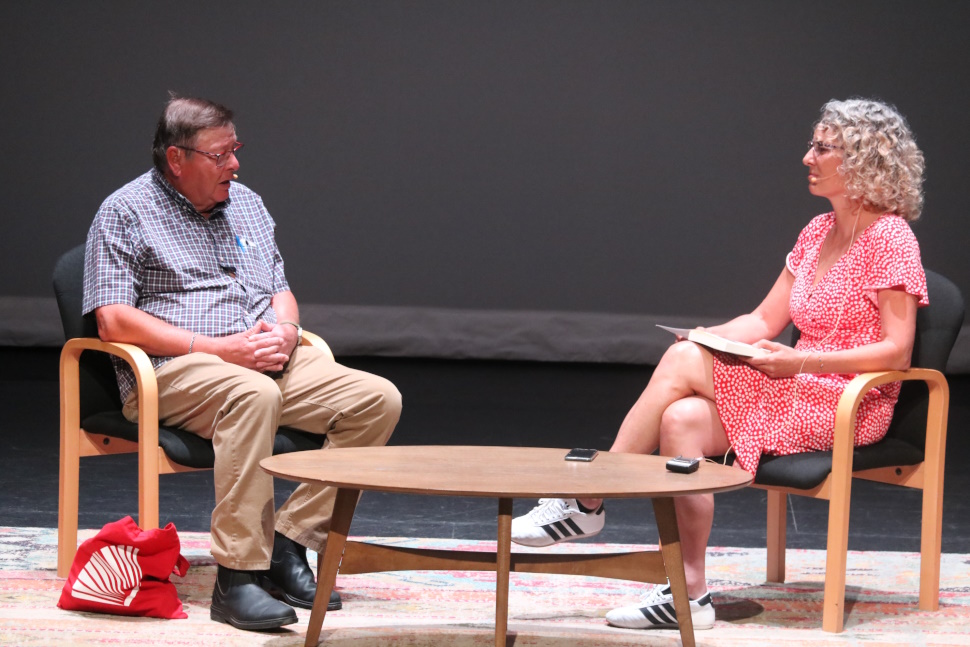The Saskatchewan Festival of Words wrapped up over the weekend in Moose Jaw, with one of the highlights being a sit-down interview with renowned Saskatchewan author Guy Vanderhaeghe.
Vanderhaeghe released his first book, Man Descending, in 1982, which won a Governor General’s Award.
He won his second Governor General’s Award for his 1996 book The Englishman’s Boy. It was the first in his popular Western trilogy that included The Last Crossing (a national bestseller and Canadian Booksellers Association Libris Award for Fiction Book of the Year) and A Good Man.
Vanderhaeghe received the Saskatchewan Order of Merit and was made an Officer of the Order of Canada in 2003. He is a three-time winner of the Governor General’s Award and has also won the Giller Prize and the Dublin Literary Award, among many others.
His newest book, Because Somebody Asked Me To: Observations on History, Literature, and the Passing Scene, was released last September.
It is a reflective collection of nonfiction essays, speeches and personal commentary spanning four decades of literary life.
Because Somebody Asked Me To earned both Book of the Year and Nonfiction Book of the Year at the 2025 Saskatchewan Book Awards.
The interview, hosted by Moose Jaw author Angie Abdou at the Mae Wilson Theatre, touched on everything from his influences to the state of book reviews, the act of writing, and art’s role in democracy.
Vanderhaeghe spoke about longevity and the challenge of having a writer’s work remembered decades later.
He said writers face long odds, comparing it to winning the lottery.
“I know how lucky I've been. Most of my books are still in print, but in the long haul it's purely a fact that in any generation of writers or in any decade, longevity is difficult to achieve,” he said.
Vanderhaeghe added that sometimes the times call for certain books. He cited Margaret Atwood’s The Handmaid’s Tale as an example. It was a hit when it came out and made a splash later because, he said, in some ways, she was right about the way North America was going.
Abdou asked how Because Somebody Asked Me To came about.
Vanderhaeghe said an early mentor of his was Morris Wolff, a 1970s and 1980s anthologist who started his own publishing company and wanted to publish Vanderhaeghe’s nonfiction.
“I thought of myself as a writer of fiction and I wasn’t a nonfiction writer, so I said no to him. He tried to persuade me and I said no, I don’t think I should do that,” Vanderhaeghe said.
After losing touch with Wolff, Vanderhaeghe later learned he had died and felt guilty for turning him down. That inspired him to revisit pieces from 1983 to the present and attempt to publish them in Wolff’s memory. The book is dedicated to him.
Vanderhaeghe said the book is a compilation of book reviews, lectures and other work.
“It was all over the map,” he said, adding he found a pattern that brought out his obsessions as a writer, his continued interests over time and attitudes towards writing and, what started about 20 years ago, with worries about the political state of the world.
“I knew I'd never write a memoir, but there are parts of this book that talk about my childhood, that talk about my university years. They are scattered,” he said.
He said it also captures a time when Canadian literature was becoming more respected with authors like Atwood, Alice Munro and Margaret Laurence.
Asked about publishing letters, Vanderhaeghe said he would not because he feels letters are an invasion of privacy, whether the author is dead or alive.
Abdou noted that Vanderhaeghe’s book reviews in the collection are long and detailed, which is rare today.
He replied that there is no longer a forum for long, intelligent reviews.
“You don’t have an audience if you don’t provide the material for the audience,” he said.
He said that changed with the invention of the internet and the downward spiral of newspapers. Newspapers in their heyday were willing to subsidize pages for writers, and it was considered prestigious to have a big-name writer for your newspaper.
With the internet, you have Goodreads and Amazon where anyone can write a review. Vanderhaeghe compared it to being asked for advice about cancer: “Who would be more qualified, me or an oncologist?” He said he feels the same way about writers being better qualified to discuss literary work.
Asked about influences, Vanderhaeghe said there were many. In his early years, it was boys’ adventure books and Boys’ Own Annual, which featured serial stories that stopped abruptly, forcing readers to wait for the next instalment. With those, he would imagine what happened next.
In his 20s, he was an avid reader of mostly female authors like Ethel Wilson, Munro, Atwood, Laurence and Mavis Gallant.
He said he didn’t take any creative writing classes. Instead, he just sat home reading and writing, so his influences are all over the place and can vary minute by minute.
Talking about his influence on the Western genre, Vanderhaeghe said he has been interested in reshaping genre fiction and is now working on a novel that plays with the detective genre.
The conversation eventually turned to politics, as Vanderhaeghe once wrote that the health of a country’s artistic community is a sign of the health of its democracy.
He said authoritarian governments of all kinds hate democracy and art, and the first thing they do is shut down artistic outlets. He recognized that there are no clear-cut answers to things we want absolutely clear-cut answers for, and it is the exact opposite of propaganda.
